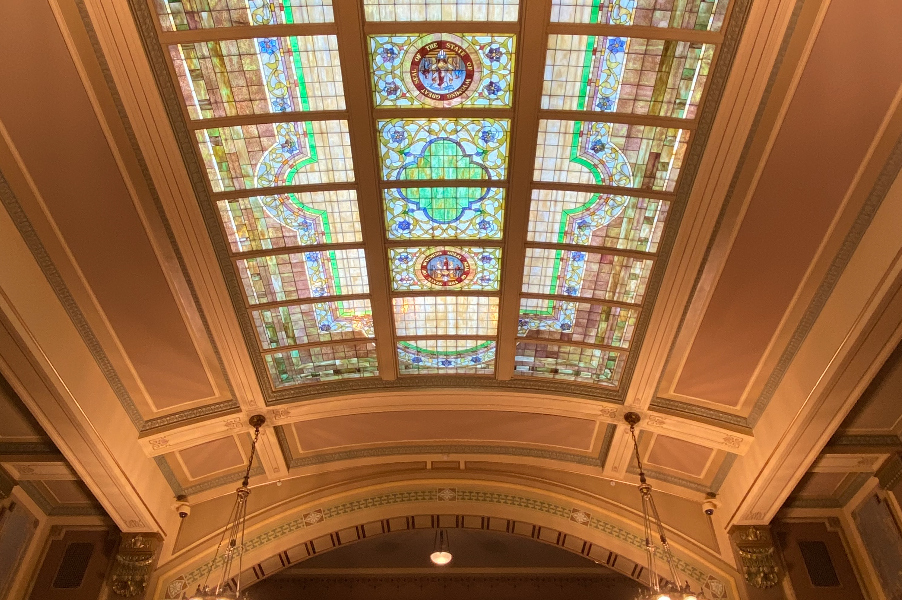By Tom Coulter
Wyoming Tribune Eagle
Via- Wyoming News Exchange
CHEYENNE — After two days without meeting due to the historic winter storm that hit southeast Wyoming last weekend, state lawmakers will return to the Capitol Wednesday with a divide between the House and Senate budget proposals that the bodies will attempt to resolve in the coming weeks.
Last Friday, lawmakers in their respective chambers finalized their versions of the state’s supplemental budget, which would cut between $400 million and $450 million in general funds from the state’s two-year budget approved last year, after considering several amendments moving around or restoring funding to certain state agencies.
In the House, lawmakers took a more “optimistic” approach, as House Speaker Eric Barlow, R-Gillette, described it to reporters last Friday. In part driven by improvements to the state’s revenue picture and oil prices in recent months, the House’s budget proposal restores more than $40 million to the state’s general fund, largely for Wyoming Department of Health and Department of Family Services programs that offer services to seniors, at-risk youth and people with disabilities.
“We’re not going to go as deep as we did into those ‘worst of the worst’ cuts, the cuts that really harm people, elders wanting to stay in their homes, the disabled population,” Barlow said.
The House’s desire to get rid of those cuts has been widespread. An amendment restoring roughly $18.4 million in state funding to a wide range of programs, including in-home services for seniors and health care waivers for individuals with developmental disabilities and children with mental health challenges, won approval by a 51-9 vote in the House.
The Senate, meanwhile, has largely stuck with the supplemental budget proposed by Gov. Mark Gordon last November, even cutting $6 million more than the governor did. While both chambers agreed to set aside $10 million to match funds for research of carbon capture technology, the Senate otherwise declined to restore as much funding to the Wyoming Department of Health.
Leaders in the Senate have described their members’ approach as being careful of temporary price fluctuations. Senate President Dan Dockstader, R-Afton, said last Friday that despite the slight uptick in revenues, “the long-term picture doesn’t really change.”
“We can speculate and say those mineral prices are going to change,” Dockstader said. “Maybe I’m pessimistic, (but) I don’t think they will, so I think the reality check has to come now, and that’s what we are urging our body to address.”
Senate Vice President Larry Hicks, R-Baggs, noted the House’s amendments largely drew from the state’s “rainy-day” savings account, reflecting the different approaches of the chambers.
“They’re one-time monies out of a savings account, which will tell you that those are not sustainable,” Hicks said in an interview last Friday. “That’s the discussion that we have on the Senate side. It’s the equivalent of kicking the can down the road one more year.”
While the rainy-day fund has roughly $1.3 billion remaining in it, the Senate’s hesitations are tied to the long-term funding shortfall in the state’s K-12 education account, which faces a projected shortfall of $300 million that is expected to increase over the next few years.
Additionally, Senate leadership noted the rainy-day fund, or Legislative Stabilization Reserve Account, consistently generates roughly 2% in interest each year; thus, senators view the savings account as a revenue stream that can bring millions in its returns.
“The more we drain (that account) down, the less that has, puts more pressure to cut programs, and so I look at it as just another revenue stream to draw, and I think the Senate is taking it pretty serious to try to protect that and not do these one-time things,” Hicks said. “Because if we don’t have an economic upturn with mineral prices and sales and use taxes … that just means next year we’ve got to come back and cut the health programs even deeper.”
Although the Senate did not restore funding for several Department of Health programs, an exception came in an approved amendment from Sen. Bo Biteman, R-Ranchester, to restore $6.5 million for the developmental disabilities waiver. However, rather than drawing from the state’s savings account like the House amendment, Biteman’s proposal would take that money from state aid provided to the University of Wyoming.
While most senators were unwilling to eliminate the third round of cuts included in the governor’s proposal, a few in the chamber were opposed to their final version of the budget. Sen. Charles Scott, R-Casper, the most experienced member of the Legislature, voted against the supplemental budget on its third reading last Friday, arguing it would harm the state’s most disadvantaged populations while doing nothing to address K-12 education spending.
“It does not touch the largest program in the state (in education), and there’s a great, big disparity there, where I think we’re spending money we do not need to in the one area and hitting the other areas too hard,” Scott said. “I do not think that is a responsible budget.”
K-12 education spending, which is authorized separately from the rest of the state’s budget, will instead likely be addressed through other legislation, including a proposal from Scott that would cut more than $100 million from the school funding model. That bill, Senate File 143, awaited a final vote in the Senate as of Tuesday afternoon.
The budget proposals will now advance through what is called the “mirror bill” process, in which the respective bills will be weighed by a conference committee made up of experienced lawmakers from both chambers. Typically done during standard budget sessions, the process often includes significant back-and-forth between the members before an agreement is reached on one of the two bills.
“The process is the folks that go represent the House advocate for the House position, and they defend the House position,” Barlow said. “I think if you look at the votes on the House side for restoring the Department of Health cuts, they’re solid votes. Fifty people voted in favor of those things, so I don’t think that our side will have much interest in paring back on those … if there’s adjustments to make, we’ll look at that.”
Members of the conference committee are slated to hash out those differences over the next two weeks.






